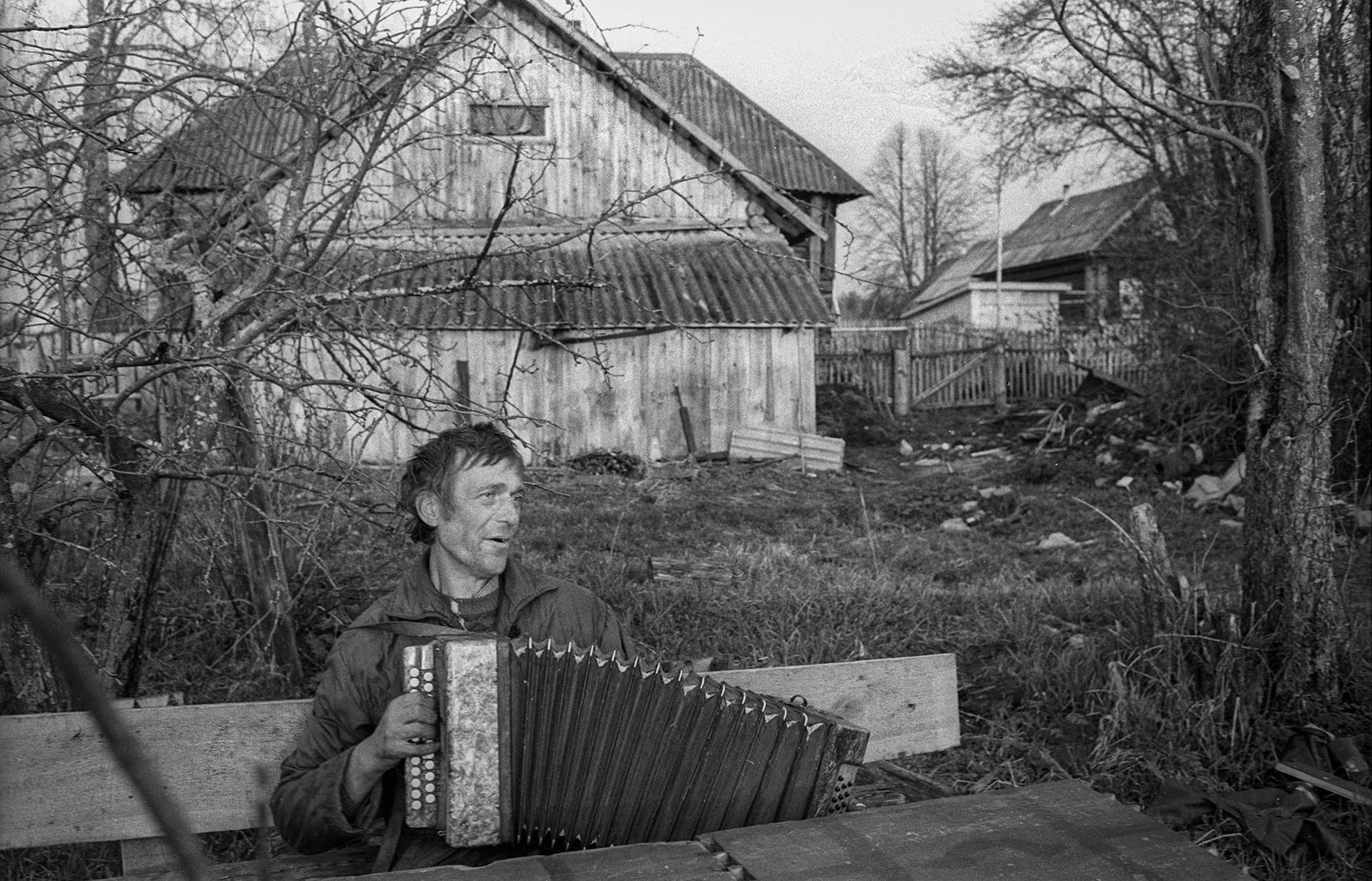"I drink, because I long to suffer purely"
Grisha lives in a village on the right bank of the Volga — only five houses still standing. He’s got a wife he ‘beats on Saturdays’ — and sometimes every day.

Don’t bother asking ‘for whom the bell tolls,’ don’t bother asking what separates East from West, South from North — just go. Travel. Talk to people — or just listen to what they talk about. Don’t be surprised. Forget the TV and the internet for a while and try to strike up a conversation with someone in the street. Ask a homeless man where you can buy cheap vodka, or ask a supermarket cashier why she’s in such a shitty mood today. Don’t play smart — that way they won’t tell you to go to hell. Always have compassion — and you’ll find the truth, the kind that kills forever your restless urge to move elsewhere.
If Tolstoy is to be believed, we are a nation of conscience. If Dostoevsky is to be believed, we are a matriarchal and religious people. And yet, at the same time, we are a people who have lost our faith, our conscience, and even the faint beginnings of civil society. We don’t say that Tolstoy once defined the moral backbone of Russian liberal thought; we just say, ‘Tolstoy is a world-class genius.’ We don’t say Dostoevsky condemned violence against the human being; we just say, ‘The whole world reads him.’ The whole world reads them — everyone but us. We are not the country of Dostoevsky and Tolstoy — we are Putin’s country.
Grisha lives in a village on the right bank of the Volga — only five houses still standing. He’s got a wife he ‘beats on Saturdays’ — and sometimes every day. A few goats too — he beats them as well, though not as often as the wife. When Grisha feels short on ‘romance and love,’ he pulls out his accordion, sits on the sagging porch or under a tree in his yard — now more a dump than a garden — and starts to play. He plays for a long time. If that doesn’t help, he begins to sing.
Not long ago, two city cops — the kind you don’t argue with — showed up at Grisha’s place. No warrant, of course, but with that look that says they smelled trouble. Grisha had been to prison twice — “two stretches,” as he puts it. They always suspect him of something. That day he was sitting on the porch, playing mournful old Russian tunes on his accordion.
“The cops walk in, start poking around everywhere. One opens the cellar and climbs down. I’m standing there thinking — he’s gonna stick his dumb head out, and I’ll whack him with the back of the axe, right on the crown — that’s one cop done. Then I’ll spin and crack the other one, the nosy bastard, standing there with his mouth open, wondering what I’ve got in the cellar besides sauerkraut. My axe’s always right there by me. When I go to bed — I set it by the pillow.
But I didn’t hit him, though I could’ve. I just said, ‘What, cops, didn’t you read my case? I’m not some petty thief — I don’t steal, I’m a murderer!’ They got scared, the fools. Never turned their backs on me again — left the house ass-first.”
Grisha didn’t kill for profit or greed; he killed out of the “delicacy of his nature.” He didn’t kill a stranger, but his little boy. “He was screaming,” Grisha says, “screaming loud and thin, right into my soul. I couldn’t stand it. I was drunk, too. So I finished him off…” Grisha told me frankly.
The second case, Grisha says, happened “by mistake.” He’d taken a dislike to his boss — she was a bitch. “So one late evening I see her — the bitch. It was already dark, and I was a bit drunk. It’s a pity I didn’t have my axe. I stepped up and hit her straight away! I thought I’d beat her to death. It didn’t work! It’s not that easy to kill someone with your bare hands. My lawyer told me later: ‘Too bad you didn’t finish her — fewer witnesses that way.’” The “mistake” turned out to be that the woman wasn’t his boss at all, but a passerby — and the wife of a policeman. And so Grisha went off on the prison transport again.
I watched for a long time as Grisha dug the soil, making garden beds in a neighbor’s yard for a bottle of vodka. For some reason it seemed to me he wasn’t planting beds or turning soil — he was digging two graves. And strangely enough, when Grisha came up to me he said just that: “Look at my work — from a distance it looks like two graves: one for granny, one for grandpa. All that’s left is to put up the crosses.” Then we opened the bottle of vodka.
When I see Grisha playing his accordion, when I hear the mournful howl of his songs, a chill runs through me. It seems to me that just a moment ago he split someone’s skull with his axe — not out of anger, but out of the “delicacy of his nature.” And that he feels so heavy, so sick with himself, that he takes his accordion and starts to play those plaintive, sorrowful tunes. And it isn’t Grisha singing in that thin, squeaky voice — it’s his murdered boy howling inside his throat, longing to break into the light.
All of this makes me so sad and dark-minded that my thoughts always come to the same thing — not to have a camera, but an axe. To set it every evening by the headboard, to sharpen the blade in the morning and run my hand along the wooden handle — to love it, in a word.
Love, you know, can be born even in inanimate things; through touch, through use — and with a human, suffering soul it comes alive in anything. About the same way, I suppose, as our Lord once made man. You can love an axe, you know. The axe is the truest object of Russian love.
And then, in the name of that love, we shall live, kill, and suffer — so much, and for so long, that in the end we’ll end up proud of our suffering.
The best way to support Freelancer

